Shortly after returning from his first leaders-level visit to Washington, D.C., Japanese Prime Minister Fumio Kishida sat down with Newsweek for an exclusive interview in his Tokyo office to discuss the main takeaways from his trip, as well as the historic changes he is overseeing in his nation’s military, economic and diplomatic strategies.
Kishida, who took office in October 2021, is looking to fortify his country’s long-standing alliance with the United States and expand regional ties. At the same time, Japan is undergoing its largest military buildup since World War II amid conflicts in Europe and the Middle East, and worsening tensions in the Asia-Pacific. Meanwhile, Kishida is also tasked with difficulties that beset Japan’s economy.
Throughout his 40-minute interview—lightly edited for space and clarity, below—with Newsweek President and CEO Dev Pragad, Global Editor in Chief Nancy Cooper and Deputy Foreign Policy Editor Tom O’Connor, Kishida spoke candidly about challenges his nation faces on multiple fronts, but he also expressed confidence that new initiatives being taken under his leadership would help Japan to navigate the deepening uncertainties that lie ahead.
Haruo Motohashi
Newsweek: You’ve just recently returned from a trip to the United States, where you aimed to fortify the Japan-U.S. alliance in your meetings with President Joe Biden. What were your main takeaways from the visit and its achievements?
Kishida: Yes, this time around, as the Prime Minister of Japan, I went to the United States for the first state guest treatment in nine years. The international community is now at a historic turning point. Against this backdrop, once again, the U.S.-Japan relationship, the importance of that, is being pointed out and in such a situation I was able to visit the United States this time. Through this visit, we confirmed that in the uncertain international situation, Japan and the U.S. are very important global partners in upholding and strengthening a free and open international order based on the rule of law.
I believe that we confirmed a solid bond between Japan and the U.S. in the areas of security, economy and advanced science and technology, including space. That was one takeaway from that visit.
In addition, I also made a speech to the joint session of the United States Congress. I was given that opportunity and, on that occasion, I expressed my thoughts on what kind of world we, Japan and the United States, as global partners, would like to hand over to next generations, going forward for the future, and also for that purpose, what kind of efforts Japan and the United States must make together. As a result, the future-oriented message I conveyed was able to gain broad support, applause and the opinions from the Congressional members. Therefore, this was a very meaningful speech in my view.
Now, in addition to that, during this visit to the United States, I went to North Carolina. In terms of the relationship between Japan and the United States, it is not only at the leaders or the government level, but, when it comes to local economy, we do have a very broad-ranging support from various people. That means that the Japan-U.S. relationship is supported by a very broad base of people from a wide range of fields. That was actually what I felt in a tangible way. So, all in all, I think that was a very meaningful and fruitful visit.
Since being elected as prime minister in Japan in 2021, you’ve overseen a vast array of reforms, especially in the economic and defense spheres, as well as a growing role for Japan on the world stage. Where would you say are your leadership priorities and what are some of the top challenges you are addressing?
When I took office two-and-a-half years ago, at that time, we were still fighting against COVID-19. This was a global phenomenon. So, overcoming COVID was one major challenge at that time. About last year, we have been able to normalize the situation regarding COVID-19.
At the same time, as you have rightly mentioned, the economic issues are what I tackled. Security and diplomatic issues have been an important focus for me as well. I have been also dealing with child and child-rearing policies to address Japan’s declining birthrate and the demographic issues.
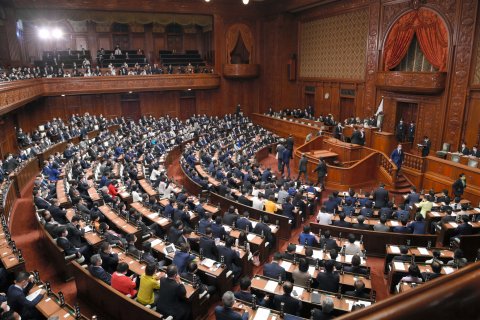
The Asahi Shimbun via Getty Images
With Russia’s aggression into Ukraine, the energy crisis globally was a challenge for Japan as well. I have presented a major policy of broadly advancing Japan’s energy policy without excluding any options, including nuclear energy. These are major policies that I have been undertaking as the Prime Minister.
Now, you asked me what is the top challenge for me, and today, it is the economy as well as diplomatic and security issues.
Over the last three decades in Japan, we have been struggling from a deflation economy where wages have not risen, prices have not risen and investment has not progressed. However, since I became prime minister, over the past two-and-a-half years I have been promoting a new form of capitalism, creating a virtuous cycle of growth and distribution that would be triggered by wage hikes, which would in turn increase consumption and motivate companies to make further investments and raise wages. And as a result, for the first time in 30 years, the Japanese economy is now showing positive signs. For example, we are seeing wage increases as well as significant increases in private investment. And the stock market has recorded record highs. These positive signs are emerging in the Japanese economy. I hope that we will be able to secure this trend, completely exit from deflation and bring Japan to a new stage of growth-oriented economy.
At the same time, in terms of diplomacy as well as security, we are in a very uncertain situation. Therefore, leader-level diplomacy shall be strengthened. We need to have defense capabilities to back up this diplomacy. So even in uncertain times, Japan can fulfill our role to achieve stability.
Speaking of those defensive capabilities, Japan has undergone extensive reforms in this sector. Why would you say these reforms are necessary for Japan at this stage and what are the leading threats that you believe these reforms seek to address?
I think we are facing the most challenging and complex security environment since the end of World War II. In such a situation, we have to protect our people’s lives and livelihoods.”
– Fumio Kishida
Yes, first of all, with regard to the security environment of Japan, if we look around, there is a country which is developing nuclear and missiles capabilities and also a country which is expanding military capabilities in an untransparent manner. Also in the South China and East China Sea, we are seeing unilateral attempts to change the status quo by force. That is the situation.
So, in view of such a situation, I think we are facing the most challenging and complex security environment since the end of World War II. In such a situation, we have to protect our people’s lives and livelihoods. Since I became prime minister, we have substantially revised Japan’s National Security Strategy.
Now, in that strategy, of course, we will not change the steps we have been taking to date as a peace-loving nation.
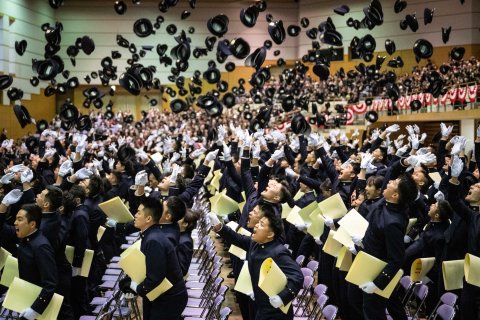
YUICHI YAMAZAKI/AFP via Getty Images
However, in view of this challenging and dire security environment situation, first of all, for Japan, we have to create a favorable environment for that purpose. Diplomacy and summit-level diplomacy have to be steadfastly promoted. While clarifying our basic standpoint, we also made it clear that we, in order to bolster the footing of diplomacy, must also strengthen the defense capability to protect our own nation. And for that purpose, Japan made clear its policy of achieving a defense budget of 2 percent of GDP, and its efforts to possess counterstrike capabilities and to improve our cybersecurity.
In addition, we strengthen the defense posture of the southwestern region of Japan. In this way, as clarified in the strategy that I mentioned earlier, toward strengthening defense capabilities, we are taking initiatives. So, step by step steadfastly, we would like to implement those measures.
The international situation is becoming more complex. Any one country cannot defend itself on its own. Therefore, in the case of Japan, in order to protect the lives and livelihoods of our nation and our people, I want to assume and fulfill our own responsibility. However, in addition to that, with the United States, our ally, and like-minded countries, and also the Global South, we would like to coordinate with all those countries through our foreign policy in order to improve the deterrence and response capabilities in this region. That is a very important initiative.
Prior to becoming Prime Minister, you had served as foreign minister and briefly as acting defense minister as well. How do you balance the Japanese defensive and diplomatic needs, particularly in the face of some regional countries who may be hesitant to accept a larger role for Japan in security given the complex history behind it?
Now, as I mentioned earlier, the National Security Strategy has been revised and, up to now, as a peace-loving nation, our trajectory will remain unchanged. We are an exclusively defense-oriented policy-emphasizing country and the three nonnuclear principles will be maintained. There is no change in the fundamental policy. That has been clearly stated in our new strategy.
Following that strategy, the favorable international environment for Japan must be realized through diplomacy. The most important fundamental principle in this endeavor is to realize a free and open international order based on the rule of law.
No attempt to change the status quo by force should be tolerated anywhere in the world. Furthermore, these rules and international laws are there, I believe, to protect vulnerable countries. So, we stress the importance of maintaining order following international rule to Southeast Asia and many countries, including those so-called the Global South.
We are receiving support from many nations regarding our stance. We should maintain the international order based on rule of law. We should bring neither conflict nor division, but cooperation in the international community. These are the messages I consider most important to work on, first and foremost.
And in order to endorse these initiatives, it is necessary to strengthen defense capabilities, which I mentioned before. Such basic thinking of Japan shall be thoroughly explained to the international community, especially to the East Asian countries. By providing such explanation, Southeast Asian countries and other countries, in turn, provided support for Japan’s National Security Strategy. We will continue to seek such support to implement the diplomatic as well as security policies of Japan. That is the balance between diplomacy and security.
Now that Japan is ready to accept this larger role in security, do you believe the region is also ready to accept Japan’s new role?
Yes, we do our best toward realizing the peace and stability of the region and also a free and open Indo-Pacific. Having said that, we have to avoid any misunderstanding here. Japan is not saying that we want to achieve this through military prowess. Rather, Japan, as a peace-loving nation, hopes to realize this by utilizing the economy and various other infrastructure support measures and also soft power such as culture and sports. I said that our trajectory as a peace-loving nation will remain unchanged. In addition to that, we have a peaceful constitution. So based on that constitution, and also based on international laws and domestic laws, we are going to carry our diplomacy and security efforts. It is also important to explain this basic stance to the region, and I think this stance is understood in the region.
And I think we are gaining understanding and support for this, particularly after World War II. In 1945, we were defeated in the war. Since that time, up until today, as a peace-loving nation, we have accumulated a track record, we have a good result and during this period, any country in the world thinks that Japan has been making tremendous efforts as a peace-loving country and they have been observing that and they appreciate our efforts in this way.
So, as a peace-loving nation, we have achieved results in this way. For many years, we have to maintain that, we have to build on that. That’s important.

South Korean Defense Ministry via Getty Images
A security challenge often identified by Japanese officials is that of North Korea, which has continued to test sophisticated missile systems. Reports recently emerged that you would be willing to meet with Supreme Leader Kim Jong Un. Is this a possibility? And what do you believe is the best way to handle North Korea if sanctions do not appear to be working?
Regarding North Korea, its nuclear and missile development is a threat not only to Japan, but also to the peace and security of the international community. I believe that the relevant U.N. Security Council resolutions stipulating the denuclearization of North Korea should be implemented completely.
In this regard, on the 28th of last month [March], it is with great regret that the U.N. Security Council Draft Resolution regarding the implementation regime of sanctions against North Korea was put forth but rejected by Russia’s veto.
On the part of Japan, we will consider further measures for the full implementation of relevant Security Council resolutions, working closely more than ever with the United States and South Korea and other like-minded countries.
We would like to continue to explore paths for dialogue with North Korea as I just mentioned, while communicating with the countries concerned, including South Korea.”
– Fumio Kishida
At the last meeting with President Biden, we also discussed the situation in North Korea, including its nuclear and missile development. At that time, we agreed to work together more closely under the current situation of grave concern, and we also had frank exchange of views, based on our common understanding that the path to dialogue with North Korea is open. We also agreed to continue to work more closely between Japan and the U.S., and Japan, the U.S. and South Korea to address the situation in close cooperation. We have agreed to this direction.
The establishment of productive relations between Japan and North Korea is in the interest of both Japan and North Korea and will greatly contribute to regional peace and stability. Therefore, under my direction, in order to resolve the outstanding issues of concern with North Korea, high-level consultations under my direct supervision will be promoted with a view to holding a summit meeting going forward. I look forward to making progress on these consultations.
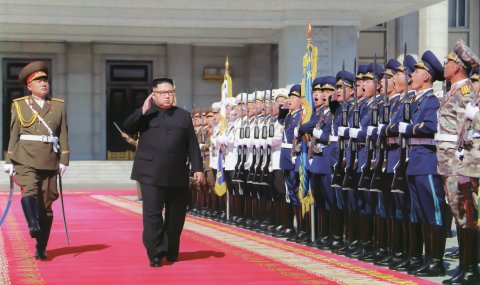
API/Gamma-Rapho via Getty Images
To clarify, would you be willing to meet with Kim Jong Un?
Well, we are now conducting various consultations behind the scenes, but unfortunately I cannot give details on the progress here so far at this point in time. But we will continue to make efforts to enable to hold a summit meeting toward resolving the outstanding issues of concern with North Korea. In this regard, I exchanged views with President Biden, based on the common understanding between Japan and the U.S. that the path to dialogue with North Korea is open. We would like to continue to explore paths for dialogue with North Korea as I just mentioned, while communicating with the countries concerned, including South Korea.
China has long been identified as a leading national security concern for Japan in part due to the existing territorial disputes and the rapid military rise of the People’s Republic. Has this concern associated with China grown, you’d say, since you’ve taken office and in what areas do you believe that Japan has to be particularly vigilant?
First of all, in the East China Sea, unilateral attempts to change the status quo are being intensified. And this is something of a grave concern for us. Japan will assert to China what needs to be asserted, and respond calmly and resolutely to the situation with the determination to resolutely defend Japan’s territory as well as territorial waters and airspace.
Now, while Japan and China share diverse possibilities, we also have many challenges and concerns. China is our neighboring country. So, this is the situation we face with this neighboring country. We will assert what needs to be asserted, but we will value dialogues as well. And wherever we can
cooperate for common challenges, we will cooperate. So, in this way, a constructive and stable relationship should be realized through mutual effort.
I believe that both Japan and China are countries that have great responsibility for the peace and prosperity of the region and the international community. It is my consistent policy to make our bilateral relationship constructive and sustainable. We will continue to pursue comprehensively a “mutually beneficial relationship,” and I believe that we must engage in a significant amount of communication with China to realize the kind of relationship I have just described.

Ceng Shou Yi/NurPhoto via Getty Images
We’ve seen some tense moments in U.S.-China relations since you’ve taken office, particularly as they relate to the question of Taiwan. Japanese officials have been speaking more about Japan’s potential role in the event of a Taiwan contingency. Have you made a decision as to what Japan’s role may be in the event of an actual conflict over Taiwan in the region?
Regarding Taiwan, now, I refrain from answering the hypothetical question of a Taiwan contingency. But I will say that the peace and stability in the Taiwan Strait are important not only for Japan’s security, but also for the stability of the international community.
It has been and continues to be Japan’s consistent position that we hope the issues surrounding Taiwan will be resolved peacefully through dialogue. During my recent visit to the United States, I stressed with President Biden the importance of peace and stability across the Taiwan Strait, and we confirmed that we would encourage a peaceful resolution of the cross-strait issues.
In this regard, it is important to convey this point directly to China. We just had a summit meeting among the U.S., Philippines and Japan for the first time. It is important to clearly convey the position I have just mentioned, in cooperation with the Philippines and other like-minded countries.
On the part of Japan, we will continue to closely monitor the developments of the cross-strait relations and make diplomatic efforts. This is the basic stance of Japan.
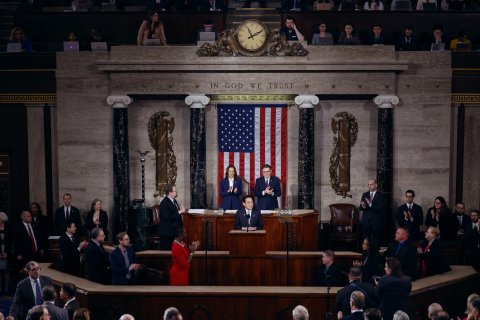
Chip Somodevilla/Getty Images
The Japanese economy’s recent recession pulled Japan below Germany and out of the top three for the first time since the 1960s. Is this a short-term problem? And how do you address demographic trends that are dragging down the economy?
Yes, as you pointed out, in terms of dollars, in 2023, Germany’s nominal GDP exceeded that of Japan. Whether that is short term or long term, that is the question. The exchange rates fluctuation and also prices increasing faster in Germany than Japan, I think these recent trends are the major reasons for the situation you have described.
However, in the long run, as I said earlier, Japan has been in the “cost-cutting type of economy” that has cut investment and the wages for the past 30 years. It has been in a “shrink-oriented” economy, so stagnation has lingered in this way.
However, finally, we are seeing some bright signs, and as such bright spots in the Japanese economy are witnessed and if such a virtuous cycle of economy is sustained, then toward the next year, the Japanese economy once again will regain power, vitality. I think that is possible.
Having said that, on the other hand, in Japan, the declining birthrate and aging population is progressing. The population decline is something we have to address and that is an important matter when you consider long-term impact on the economy. It is also important to create an environment that enables the younger generations who want to have children to have and raise children by continuing to implement child and child-rearing policies.
At the same time, it will be a major point to see if we can create a country that can adapt to a declining population by promoting digitalization and other efficiency measures that will enable it to cope with a declining population and streamline Japanese society, especially its administrative and financial organizations.
So, if the Japanese economy revives, and it can respond to population decrease, then for the future, the Japanese economy will be able to move forward in a robust way. So that is what I want to achieve, and that is the kind of policy I have been implementing.
There are still some in Japanese society who are resistant to the idea of continuous, indefinite immigration of labor from overseas. So, we are considering a way of inviting foreign nationals … by establishing a set of rules, though not a full-fledged immigration concept.”
– Fumio Kishida
Would you be interested in encouraging immigration in order to reverse the population decline?
First of all, Japan is responding to its declining population through the child and child-rearing policies I mentioned earlier, as well as through digitalization and other measures. And at the same time, it is very important to create a system in which motivated and energetic elderly people and, above all, women can play an active role in Japan’s society and economy through reforms of work styles and other measures.
But having done that, there is still a labor shortage and shortage of workers, and we must consider inviting highly capable workers from outside of Japan to be active in the Japanese society and economy. In the current Diet (national legislature) session, we are discussing the amendment of the law in order to create a new system to have motivated people from overseas work in Japan. For highly capable and motivated workers to be invited into Japan to provide support to Japanese society is what we would like to enable.
But there are different, diverse views in terms of immigration in Japanese society. There are still some in Japanese society who are resistant to the idea of continuous, indefinite immigration of labor from overseas. So, we are considering a way of inviting foreign nationals to come to Japan in the form I have just described by establishing a set of rules, though not a full-fledged immigration concept.
How do you help Japanese manufacturers keep their edge against global competition, especially from Korean and Chinese brands? Is automation being adopted quickly enough in Japan and have Japanese automakers been too slow to invest in electric vehicles?
Our country is competing not only with China and South Korea, but also with companies from all over the world, including developed countries. Now, my economic policy is to use social challenges including climate change and population decrease as an engine for economic growth in the long run. That is to say, public sector, private sector working together in solving these social challenges and turning them into a growth engine. From that
perspective, we are investing in what we call GX (green transformation) and DX (digital transformation), with particular emphasis on these areas.

Tomohiro Ohsumi/Getty Images
Regarding GX, we will provide bold, upfront investment support on the scale of 20 trillion yen [$129 billion] and hope to realize GX investment of more than 150 trillion yen [$964 billion] over the next 10 years through private-public initiatives.
In the area of DX, for example, in the area of semiconductors, we set aside about 2 trillion yen [$13 billion] of support. At the recent Japan-U.S. summit meeting the other day, we agreed to strengthen cooperation in the area of increasing resilience of supply chains and work together from the economic security perspective.
Now, when the population is declining, it is very important to increase productivity. In Japan, we put together a domestic investment promotion package in order to provide intensive support for large-scale investments in strategic areas and support SMEs (small and medium enterprises) in labor-saving investment.
As you pointed out, with regard to EVs, we are seeing a rapid shift to EVs, and Japanese manufacturers are responding to the situation with a sense of urgency. Earlier, I mentioned that I visited North Carolina during my visit to the United States. In North Carolina, a huge factory is now being built to produce batteries for Toyota’s EVs. So, in this way, Japanese manufacturers are making strategic investments in the electric vehicles area as well.
Going forward toward the realization of carbon neutrality in 2050, while maintaining “a variety of options” as our basic strategy, we would like to continue to maintain and strengthen the competitiveness of Japanese companies by providing comprehensive support for EV purchase subsidies, recharging infrastructure development, strengthening the domestic manufacturing base for storage batteries and securing upstream resources, in order to “win also in EVs.”
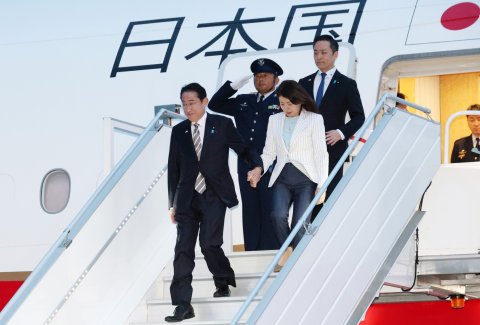
The Asahi Shimbun via Getty Images
Prices are rising again. The Bank of Japan is raising borrowing costs for the first time in 17 years and the Nikkei 225 has finally topped its 1989 peak. You say Japan has a historic opportunity to exit deflation. What needs to happen for your country to seize this opportunity? And what are the risks that your administration worries about if it does not succeed?
Price hikes are now a very big issue in our country. We feel strongly that it is important to raise wages more than price hikes. That is why the government is now mobilizing all possible policies to raise wages, reduce income and inhabitant taxes this June and launch a new tax-exemption system for individual investments called NISA (Nippon Individual Savings Account) in January this year. The NISA system has been launched to redirect the financial assets of households, which are said to amount to 2,200 trillion yen [$14 trillion], to corporate investments.
By having the value increase for companies, then the benefits can be returned to households, which will help create a virtuous cycle that will lead to consumption and investment again. I believe that it is first important to achieve disposable income that exceeds prices by mobilizing all of these policies.
Although monetary policy itself is obviously decided by the BOJ [Bank of Japan], we hope that the BOJ will pursue monetary policy while keeping in mind the various policies of the government, through good communication between the government and the BOJ. It is important that a virtuous cycle in the Japanese economy can be established in Japan toward next year, by so doing.
High prices are a major issue today, and there are uncertainties such as the weak yen or the situation in the Middle East. So, it is difficult to be optimistic. However, I believe that it is important to implement policies to firmly raise disposable income, including the wage increases I just mentioned, while minimizing the impact of price increase[s] as much as possible, in order to protect the lives of the people and the future of the Japanese economy.
